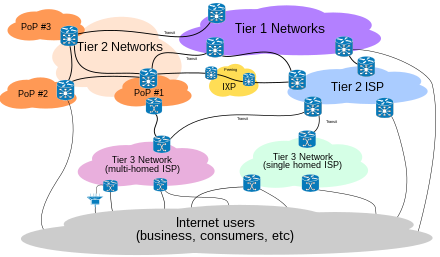Transit traffic (network)
Transit traffic is a term used in network technology and refers to the service , traffic through a network by forwarding. The contractual partners are mostly providers of different sizes , with the larger provider providing a so-called uplink for a fee. The amount of data transferred is billed .
In contrast to transit, the term peering is understood to mean an agreement between providers of equal rank for data exchange among each other.
Basic functionality
The Internet access service comes about through the provision of Internet connectivity , i.e. the transfer of data packets in and out of the Internet. Forwarding to the Internet can take place via direct access to Internet nodes or via the networks of other Internet service providers . When deciding on links between different autonomous systems, economic concerns are in the foreground ( policy-based routing ).
A transit agreement is required for an autonomous system (AS) to forward all traffic from another AS. In contrast to this, with peering only the traffic between the two partners is forwarded and in particular no transit traffic. While peering at public Internet nodes used to be characterized by lower costs than transit agreements, now falling transit prices are causing the opposite development.
Depending on the size of their own networks, Internet service providers are divided into different categories, so-called tiers .
The Tier 1 category involves large AS, for example backbones such as that of the US telecommunications company AT&T . These form the top layer and do not buy any transit themselves, but only peering with other Tier 1 AS.
Providers of supra-regional networks form the tier 2 category . These buy transit traffic from Tier 1 AS, which is referred to as downstream , and in turn sell transit traffic to Tier 3 AS, similarly referred to as upstream . Vodafone falls roughly into the tier 2 category.
The last category, Tier 3 , is made up of smaller, local providers (e.g. Unitymedia ), which in turn i. d. Usually do not sell a transit to other ASs. These partially peer with each other and sell transit to end users.
Transit with Freifunk
According to the Picopeering Agreement, an agreement on principles for the development of free networks, the participants in Freifunk undertake to generally free transit traffic.
literature
- James F. Kurose , Keith W. Ross: Computer Networks ISBN 978-3-8273-7330-4 (standard work)
Web links
- This is how Internet routing works: Tier 1 to 3 , Stefan Dierichs, Prof. Norbert Pohlmann, as of September 15, 2008, accessed: March 12, 2014
